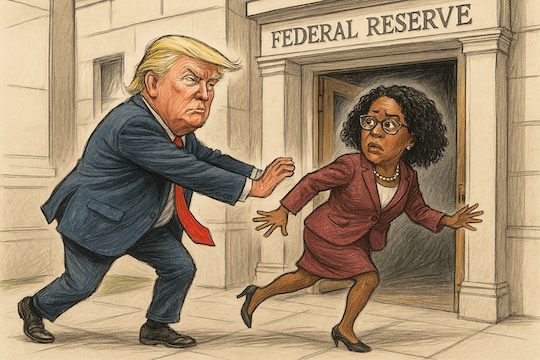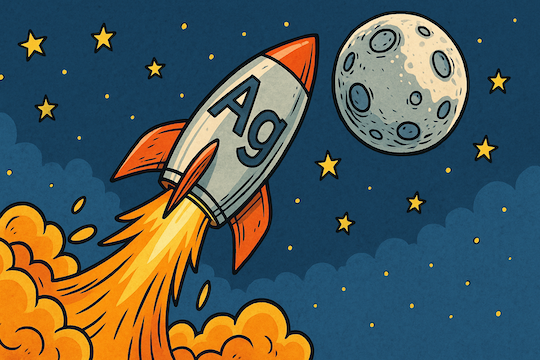
Posted May 13, 2025
By Sean Ring
Oil, Guns, and Freedom: Alberta’s American Dream
When Donald Trump famously floated the idea of buying Greenland in 2019, the media laughed. But in classic Trumpian fashion, the real message was buried beneath the bluster: America should never stop looking for strategic, resource-rich acquisitions.
Fast-forward to 2025, and the notion of U.S. expansion is no longer hypothetical. Thanks to a potent mix of political alienation, economic frustration, and elite overreach in Ottawa, one Canadian province—Alberta—is now seriously contemplating a future inside the United States.
And this time, Trump may not need to buy anything.
He just needs to open the door.
With former Bank of Canada (and Bank of England) governor Mark Carney now serving as Canada’s Prime Minister, many western Canadians feel more disenfranchised than ever. Carney’s Harvard pedigree, globalist ideology, and climate-first agenda have alienated Albertans whose livelihoods depend on oil, gas, and free enterprise.
As one viral tweet put it, “Alberta wants out. America wants in.”
While Trump has long mused about acquiring all of Canada, Alberta alone might be the perfect consolation prize—delivering energy security, economic growth, and political realignment in one swoop, without all the left-wing baggage.
Let’s explain why this is gaining momentum, what’s at stake, and what it would take to make it happen.
The Case for Alberta: Prosperity, Power, and Political Symmetry
1. Texas North: America’s New Energy Crown Jewel
Alberta isn’t just oil-rich—it’s resource-dominant. With the third-largest proven oil reserves in the world, Alberta’s energy assets rival those of the Middle East.
Under Canadian federal rule, however, Alberta’s producers face suffocating regulations, pipeline rejections, and federal climate mandates that treat fossil fuels like a moral failure.
With Carney pushing net-zero timelines and Environmental, Social, and Governance (ESG) frameworks at the national level, Alberta’s energy sector has become a punching bag for Ottawa’s elite class. Why they insist on badgering their golden goose is beyond me.
By joining the U.S., Alberta could deregulate, drill, and deliver—not just for its benefit, but for the entire North American economy. The U.S. wouldn’t just import oil from an ally but own the supply.
That’s not just energy independence. That’s energy dominance.
2. Economic Muscle Without the Redistribution
Alberta has been Canada’s economic engine and federal piggy bank for years.
Despite representing just 11% of Canada’s population, Alberta routinely contributes more to the national budget than it receives. Massive fiscal transfers—often in the billions—flow eastward to prop up politically favored provinces like Quebec and the Maritimes.
If Alberta became a U.S. state, that economic surplus would stay home—or, more likely, be redirected into American infrastructure, military investment, and energy development.
It wouldn’t just be one of the wealthiest U.S. states—it would also be one of the most productive, especially per capita.
3. Cultural Alignment with Red-State America
If Alberta were a U.S. state, it would likely vote Republican by 20 points.
Gun rights? Check. Low taxes? Check. Deep suspicion of central government? Check.
Albertans share far more culturally with Wyoming ranchers and Texas oilmen than with Carney’s climate technocrats or Ontario’s progressive electorate. Their politics are rugged, resource-driven, and unapologetically pro-capitalist.
My friend and colleague Ray Blanco shared this fascinating X post, covering this very point:
 Credit: @AARNOEXCELLENT
Credit: @AARNOEXCELLENT
Alberta is America already in many ways—just waiting on the paperwork.
4. Strategic Geography and Military Benefits
Alberta offers enormous strategic value to the U.S. military and continental logistics. Control of the Canadian Rockies, northern transport corridors, and Arctic gateway routes would bolster North American defense.
Integrating Alberta into U.S. command structures—whether NORAD, Northcom, or energy grids—would give America greater redundancy, resilience, and reach.
And Alberta’s wide open spaces would be ideal for missile silos, radar installations, and energy infrastructure. It’s not the whole enchilada, but it could go a long way to solving America’s Russia/China/Arctic problem.
The Carney Problem—and Alberta’s Growing Fury
Mark Carney’s rise to power was the final straw for many Albertans.
After years of Trudeau’s east-coast favoritism and carbon tax dogma, Carney’s ascent confirmed what many feared: Canada’s ruling class would never tolerate Alberta’s resource-first economy.
Carney isn’t just a banker. He’s a Davos disciple.
He’s spoken openly about reshaping capitalism to prioritize climate change and social equity. It’s idiotic in theory. In practice, it means Alberta’s oil fields, pipelines, and natural gas are obstacles to be eliminated, not assets to be leveraged. It’s climate lunacy on the level of the UK’s Ed Miliband, yet another Davos dumbass.
This top-down ideological governance is accelerating Alberta’s desire for a clean break.
Friend and colleague Enrique Abeyta posted the New York Post story, “Alberta’s Break-Up Talk With Canada Gets Real.”
While Premier Danielle Smith has avoided direct calls for separation, she’s left the door open. And that door might swing wide open if Carney continues his war on hydrocarbons.
What’s Stopping the Alberta Move?
Of course, admitting Alberta into the Union isn’t simple. Here are the biggest hurdles:
1. Legal and Constitutional Quagmires
Neither the Canadian nor the U.S. Constitution lays a path for a province to secede and join another country.
Alberta would likely have to declare independence first and then negotiate U.S. statehood as a sovereign entity. That would open a Pandora’s box of legal, diplomatic, and potentially military challenges.
Ottawa would never allow it without a fight. And Washington, for all its political theatre, would be reluctant to set off a major international crisis without overwhelming public support.
2. Political Resistance in D.C.
Let’s be blunt: Democrats would fight this tooth and nail, as Republicans probably would fight admitting Canada as a whole.
Admitting Alberta could mean two new Republican senators, five to seven GOP House members, and a surge in conservative electoral power.
Unless Alberta flipped purple overnight (highly unlikely), the left would resist with everything it has.
3. Division Within Alberta Itself
Not all Albertans are on board.
Some prefer Canadian federalism with tweaks, others want full independence, and still others fear what joining America could mean for healthcare, social services, and cultural identity.
While pro-annexation sentiment is growing, it hasn’t yet reached critical mass.
Polls show that a large minority would consider U.S. citizenship if their assets and social protections were guaranteed. But that’s a tall order, and skeptics remain vocal.
4. International Fallout
What would NATO say? The EU? China? Russia?
Even if Alberta joined willingly, it would shatter the illusion of Western political cohesion. Carney’s allies in Europe would decry the move as American imperialism. China might cite it as justification for Taiwan.
Even former PM Justin Trudeau—now consigned to the lecture circuit—would probably find a way to tweet about how “deeply concerned” he is.
So… Will It Happen?
Here’s the short answer: unlikely—and yet more plausible than ever.
If Carney stumbles, expect the Alberta conversation to accelerate. If Carney doubles down on his net-zero agenda, expect that acceleration to become a stampede.
The next Alberta election could become a de facto referendum on independence or statehood.
And if Smith or her successor goes all in?
We could be looking at a constitutional crisis on both sides of the 49th parallel.
Wrap Up
Mark Carney’s reign is sparking Canada's greatest federal-provincial showdown since Confederation. His economic vision aligns more with the World Economic Forum than the Wild Rose Country.
And that may cost him his country.
Alberta doesn’t need to conquer anything. It just needs to leave.
For Donald Trump, this is a geopolitical layup. Alberta brings energy, prosperity, and red-state alignment in one clean package. No foreign war. No occupation. Just open the door, and then deal with the fallout.
He may want all of Canada. But if he can’t get it?
Alberta will do just fine.
Would you support Alberta becoming America’s 51st state?
Write us at feedback@rudeawakening.info and let us know. We’ll publish some of your responses in the next mailbag.
Have a great day!

A Philosophy For Living
Posted August 28, 2025
By Sean Ring

The Crowd’s Madness Saves Uncle Herschel
Posted August 27, 2025
By Sean Ring

The Fed's Cook is Goosed
Posted August 26, 2025
By Sean Ring

The Ascent of Ag in 5 Tweets
Posted August 25, 2025
By Sean Ring

Rickards on Sovereign Wealth Funds
Posted August 22, 2025
By Jim Rickards

